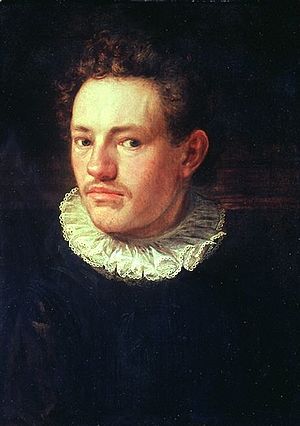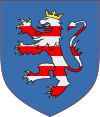August Hagel (Merveilles des Morte)
| August Hagel | |
|---|---|
 Portrait of August Hagel by an unknown artist | |
| Born |
5 November 1487 Erfurt, Thuringia, Holy Roman Empire |
| Died |
21 October 1571 Rome, Papal States |
| House | House of Jenagotha |
| Father | Thin White Duke |
| Mother | Blanche de la Marck |
| Religion | Roman Catholicism |
August Hagel (5 November 1487 - 21 October 1571), also known by his birth name of August von Jenagotha, was a German scholar, philosopher, and author, considered one of the key thinkers of the Northern Renaissance. August was born during the Lenzburg-Premyslid War to the Thin White Duke and Blanche de la Marck, a controversial pairing.
By 1487 the Thin White Duke had begun to act increasingly erratically and cruelly. The Duke's Swissophobia, fueled by the death of his son William of Talstein, and frustrations regarding the ongoing war and Otto of Lower Mark's refusal to surrender, caused him to lash out against the enemy Duchy of Saxony. Despite the attempts by Engelbert II of Saxony to negotiate a more favorable peace, the renegade actions of "Otto the Terrible" made such a solution unreachable. The city of Wittenberg was sacked by Thuringian forces, and the Saxon royal family was imprisoned. The Thin White Duke took multiple women of the family as his own "war prizes", polygamously marrying them in secret—a fact that would not become public until decades later. Blanche de la Marck was one such woman, giving birth to August in November 1487 as a result, and dying of poor health only a few years later.
August grew up a sickly child, especially in comparison to his brother Gotthard who was exceptionally large. His childhood would prove to be neglectful and miserable at the hands of many of his siblings, and the exact circumstances of his birth and his relation to the Duke were obscured throughout. The exact fate of his mother would be learned as a young adult, causing him to resent his family and clash with family strongmen such as Hugh the Heir. While the Thin White Duke maintained a policy of support and housing for all his children, nothing was guaranteed following his death, and as an adult August fled Thuringia out of fear of what Hugh or another one of his siblings might do to him.
Religion would be something August wrestled with his whole life, as detailed in his later writings. During the Protestant Reformation he considered the teachings of Konrad Jung, but ultimately rebelled against the wishes of his father and the rest of the family, instead becoming an Erasmian Catholic. August would be one of the few descendants of the Thin White Duke not to disavow Roman Catholicism, and was touted as Catholics as an anti-Jungist poster boy, something August did not wish for. Eventually settling in the Archbishop of Mainz as an attendant to Archbishop Bertrand of Mainz, August received a stipend in the hopes of producing anti-Jungist works. He would produce a number of theological theses like the rest of the Mainz school, although his responses were often less derogatory and fiery than many of his more zealous counterparts. During the Nuremberg Crisis, in which Hesse assembled an army against Mainz, he fled the city fearing extradition to Thuringia.
August settled in the Papal States, adopting the surname of Hagel to disavow his original lineage. He continued to write numerous books and live a largely ascetic lifestyle. He disavowed the more militant actions of the Papacy, including the Pope's role in the Italian Wars and the Kerpen War, causing him to lose Italian patrons. He lived the rest of his life in poverty and outside the public eye, eventually dying of poor health in 1587 while on pilgrimage to Rome.

